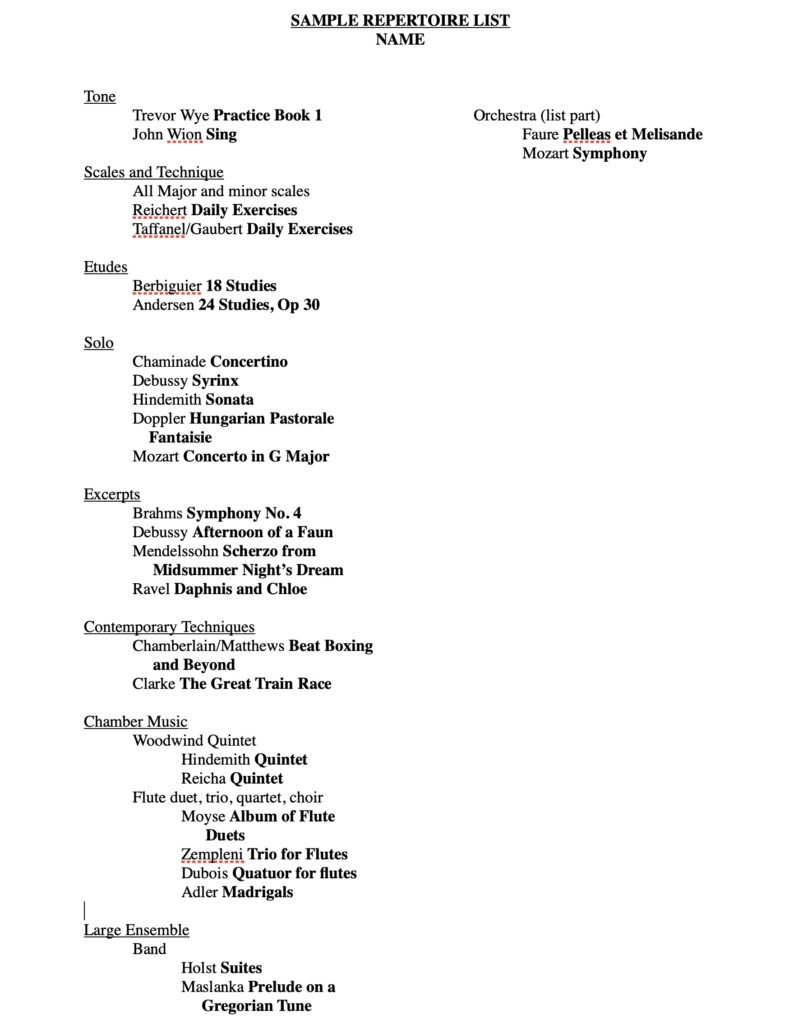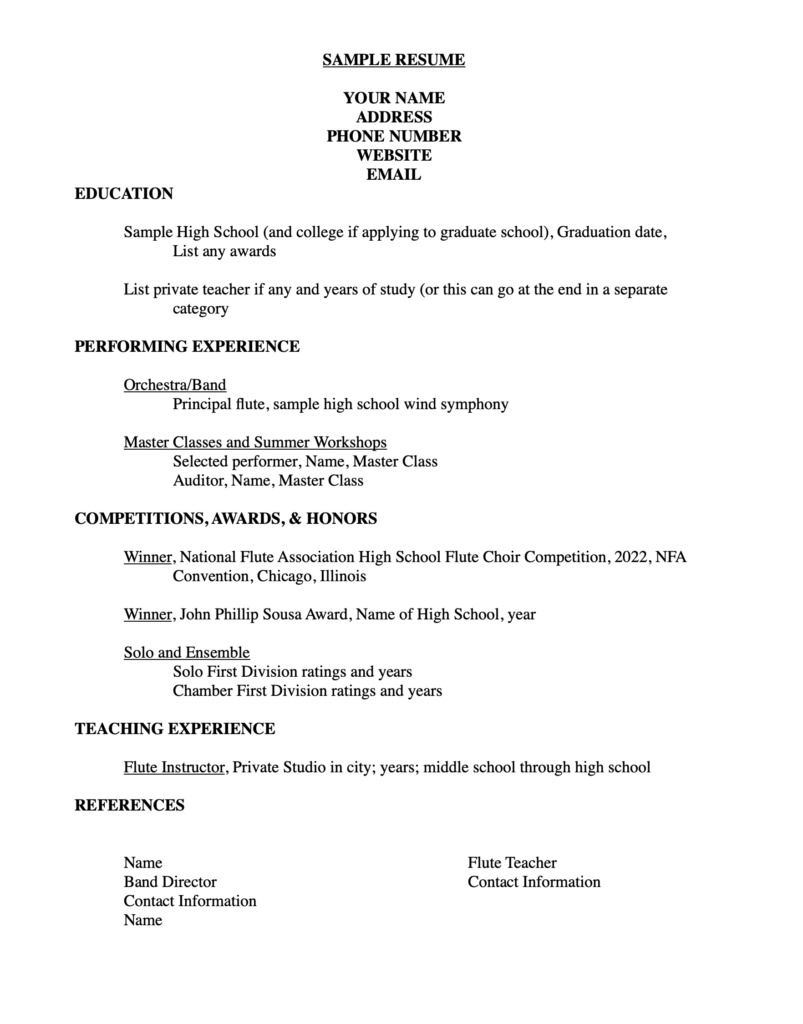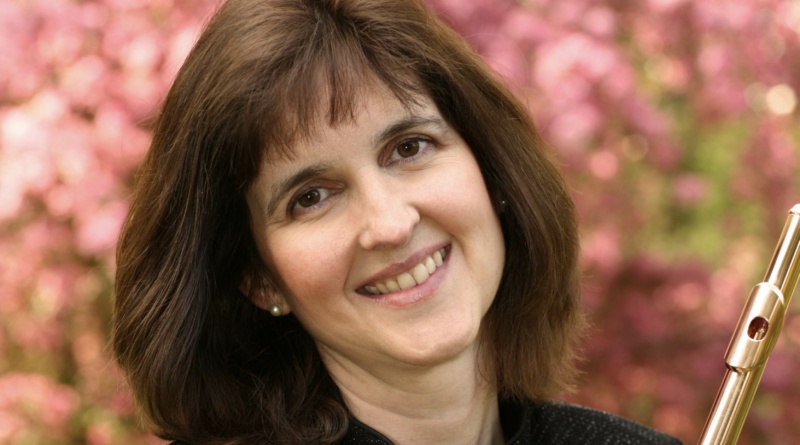Careers in Music for Flutists
Dr. Julie Stone, Professor of Flute, Eastern Michigan University
Julie Stone is Professor of Flute at Eastern Michigan University. She was a winner of the National Flute Association Professional Performers Competition, a featured performer in the International College Music Society Conference in Berlin, Germany, and has recorded for the Albany, Crystal, and ACA Digital labels. She is the author of the award-winning book Notes on the Flute and is the composer of several flute ensemble pieces.
In today’s world, music jobs include a wide variety of possibilities in addition to the traditional paths of either performing or teaching. While these careers certainly continue to be valid career paths, there is an emerging diversity of careers in the field. It is also widely known that employers like to hire those with a music degree even if the job is not music related. Musicians are known for having good skills at organization, discipline, interpersonal communication, problem-solving, and team work. It should be noted that it is important in the field of music to cultivate strong relationships along the path to a successful career. Always be respectful, responsible, prepared, energetic, and nice! The relationships cultivated along the career path can and will lead to future opportunities. Listed are selected careers that one can consider with a music degree although some require additional instruction.
PERFORMING/MUSIC
Orchestra
Most orchestral musicians have at least a bachelor’s degree in music and many have graduate degrees or performance certificates. Orchestral musicians need strong self-discipline to practice and some financial stability is required to attend auditions. It is very difficult to obtain a position because there are so few openings, so tenacity and perseverance are required in both practice and desire to pursue this career. Benefits (health, life, retirement, etc.) are generally included will full-time orchestras but not smaller, regional orchestras. Many combine positions in regional orchestras with other careers such as private studio teaching, chamber music, etc.
Band, Military Band
Most military band personnel have a bachelor’s degree in music and many have graduate degrees. These bands vary widely as far as performance opportunities and most require military basic training with the exception of the Marine Band in Washington, D. C. These offer good benefits and offer an early retirement. Military bands include travel, and in some cases, can help with loan repayment, instrument purchases, and graduate degree tuition.
Chamber music
Most of these musicians have degrees in music and many have graduate degrees. These groups require a lot of entrepreneurial, organizational, marketing, and interpersonal skills to keep the ensemble afloat and require extensive travel. Benefits not generally included.
Solo
Most have degrees in music. This is an exclusive career and only a very few musicians can make this a career without other career opportunities. Travel is a must and benefits are not generally included.
Studio Musician
Most have degrees in music and are usually based in NYC or LA. Good sight-reading skills are a must along with good networking and interpersonal skills. This is generally freelance work and benefits are not generally included.
Composer (classical, video game, film, television)
Most have degrees in music and many have advanced degrees. Many composers have college positions while others elect to freelance. It requires a good ear and creative mind along with some piano skills and knowledge of instruments/voice. It is important to be technologically savvy for the software and to have knowledge about publishing or self-publishing. Benefits are not included generally unless affiliated with an organization or university.
Music Arranger
Most have degrees in music. Requires a good ear, creative mind, and technological skill for the software. This is usually freelance work so requires good networking skills. Should have good knowledge of instruments and voices along with publishing or self-publishing. Benefits are not generally included.
Freelance Performer
Most have degrees in music. This is not as stable as other careers so requires a good sense of organization, budget, networking, and marketing. For this career, it is especially important to be reliable, organized, and punctual (as well as all other careers) in addition to good sight-reading skills. Benefits are not included. Many freelancers combine different aspects of the industry to make a living such as private studio teaching combined with performing.
Pit Musician (musicals, opera)
Most have degrees in music. Many schools offer degrees in multiple woodwinds for woodwind doublers who are frequently required in musical pits while opera pits are generally individual instrument. It is important to have good sight-reading skills. This is generally freelance work but there are several permanent positions in opera pits. Benefits are not included generally but included with permanent positions.
Conductor
Most conductors have degree(s) in music. It is good to have a charismatic personality with leadership and networking skills. There are many dedicated positions with major organizations and college positions but many are also freelance requiring much travel. Benefits depend on the position.
DJ
Degree(s) in music technology or general music would be beneficial but not required. A DJ should be good with electronics and sound combined with good interpersonal and motivational skills. Benefits depend on position
TEACHING
Music Educator
A music educator requires a college degree or certification in music education except for some preschool programs generally. Positions are available in public, private, and preschool areas. Benefits are generally included depending on position.
College Professor
College positions include many areas such as private studio (applied) teacher, conductor, theory, history, business, therapy, electronic, ethnomusicology, composer, etc. The DMA is usually required for tenure-track positions (full time, long term) although some with master’s degrees can be hired, especially for the lecturer/part time positions. Graduate degrees should be in the specialty area. For applied areas, the bachelor degree can be in performance, education, or any other area of interest in music. Master’s and DMA degrees are generally in performance, but it is also good to have strengths in other areas for today’s market. Benefits are included with tenure track generally but other positions may include benefits
MUSIC THERAPY
Music therapists use music to assist various populations such as geriatric, prison, school, hospital, rehab, etc. to help acquire skills to assist with quality of life. This is not simply performing music, but using it as a clinical tool to develop a particular skill with clients.
A bachelor’s degree in Music Therapy is required with an internship and national certification. Many schools throughout the country offer this degree but not every school.
A music therapist will generally need to become proficient at voice, guitar, and piano.
Benefits depend on the position.
MUSIC BUSINESS
Music and Instrument Sales
This position can be at music store and/or online. This position will generally require travel to flute festivals, etc. Benefits depend on position. A good knowledge of music and instruments is a must.
Instrument Maker
One must have a creative mindset with mechanical skills. Many companies may hire apprentices to learn these skills. Education varies greatly, but it is a good idea to be able to play the instrument at a decent level. Benefits depend on position.
Instrument Repair
This position requires mechanical skills and ability to play the instruments. Many companies will hire and train apprentices, although there are several specialized schools for instrument repair. It is a good idea to have a general BA/BS degree in music of some sort. Benefits depend on position.
Broadcasting
This includes radio/television/social media platforms. No particular degree is necessarily required, but extensive knowledge of subject matter is a must. It is good to have a strong, outgoing personality. Benefits generally included with a permanent position.
Marketing/Publicist
This field is increasing in importance in the music industry. Skills targeting social media and other informational outlets are important. There are specialized courses offered to increase these skills without having to get a college degree in music business, but a degree in music business would be beneficial. Regardless of position, every musician should have some knowledge of marketing and publicity in today’s world. Benefits depend on position.
Artist Manager/Talent Agent
These positions require strong skills in marketing, organization, and networking. There is no official college degree required but a good knowledge of business and entertainment is necessary. Being an agent/manager most likely involves some travel. Benefits depend on position.
Tour Manager/Concert Promoter
These positions require travel many days of the year with strong organizational skills and the ability to handle stress with good problem-solving skills. No official college degree is required. There is significant 24/7 work and benefits depend on position.
Venue Manager
This position requires a college degree in some sort of business most likely. A good knowledge of some sort of music or sports is a good idea. Must have the ability to handle stress with good problem-solving skills. Significant amount of night and weekend work. Benefits included most likely.
Contract Negotiator
This career does not necessarily require a law degree but a specialty in entertainment law would be helpful if working with musicians. This requires strong interpersonal skills for negotiations. Benefits depend on position.
Producer
This position does not necessarily involve a college degree, but it is a good idea to have education in the areas of interest. Most likely involves organizing, and sometimes financing, productions. This involves various kinds of production; music, sports, television, movie, etc. Benefits depend on position.
Web Designer for Musicians
This requires knowledge in the field but no specific college degree necessarily. There are many programs and short seminars offered to learn these skills. It is very important in today’s world to know some web design and everyone should have basic skills in web design and graphic design. This is generally freelance and benefits depend on position.
Publishing Editor
This position would most likely require a degree, and probably a graduate degree in English or something similar for scholarly publications, and a music degree for music publications. It requires detail-oriented skills, marketing, and some software knowledge. Opportunities can include traditional scholarly book publications but also online magazines such as The Flute View. It can also include music editing with music publishing companies. Benefits depend on position.
Journalist/Critic
Being a critic does not necessarily require a college degree but knowledge of the area is a must. For journalists, a college degree in journalism would be a plus but not necessarily required. These careers involve writing about events/music and/or opinions. It is a good idea to have good interpersonal skills to navigate any perceived negative reactions. Benefits depend on position.
Concert Technician
This requires good knowledge of the subject matter but does not necessarily require a college degree. Areas include lighting, sound, ticket management, etc. Benefits depend on position.
Social Media Specialist/Influencer
This career requires strong social media knowledge but not necessarily any college degree. One must have strong technology knowledge, interpersonal skills, knowledge of marketing, live streaming, graphic design, and have an outgoing personality. Some jobs may be available in college/university music departments or other organizations but most are freelance requiring the ability to obtain sponsorships. Benefits depend on position.
Podcaster
No college degree is necessarily required for podcasting but extensive knowledge of subject matter is imperative. One must have good interpersonal skills, sharp/quick thinking for interviews, good speaking voice, and knowledge of production such as sound, recording, script, marketing, and social media. Check out podcasts such as Flute 360o or Flute Unscripted for ideas. This is generally freelance so must have skills to develop sponsorships. Benefits are not generally included.
Entrepreneur
There is no degree required but advanced degrees are a good idea for credentials. Must be creative to think out of the box to address areas that are needed. An entrepreneur should have a good business sense in marketing, interpersonal relations, finances, and be skilled with technology and social media. Most entrepreneurs will likely combine different areas to culminate in a full career such as career coach, private lesson teacher, social media advisor, content creator, influencer, etc. Benefits depend on position.
Author/Blogger
Good writing skills are a must for these careers but no college degree is necessarily required. These require creative ideas, good knowledge of technology and subject matter, and strong typing skills. Benefits are not generally included.
Attorney/Law School (Entertainment lawyer, others)
This requires law school after some sort of undergraduate degree but no subject in particular. Many choose political science and related areas, but if interested in entertainment law, a degree in an entertainment field is a plus. Must take the LSAT for entrance and application to law school. Must take BAR exam to be certified. Benefits depend on position but generally included with a law firm.
Medical Doctor/Medical School
This requires medical school with an undergraduate degree usually in the sciences but many musicians have gone on to medical school with a music degree. One must take the MCAT for application into medical school. This career takes many years and one must take medical boards for certification to practice medicine. Benefits are generally included.
Physical Therapy/Occupational Therapy (entertainment/sports)
These fields require certification and specific college degrees. For entertainment/sports focus, a knowledge of the field would be necessary. For example, musicians often will seek out Occupational Therapists for any physical problems that arise from overuse or repetitive use. These therapists should have good knowledge of the field to be able to help. Benefits depend on position.
ADMINISTRATION
Non-Profit Leadership
This career requires knowledge and most likely a degree or certificate in non-profit leadership. These positions work with organizations such as music, medical, social, charity, and religious, which are not profit based but devoted to certain causes. One music have good leadership, interpersonal, and organizational skills, along with good fundraising skills. Benefits depend on position.
Festival Director or Employee
Some sort of college degree would most likely be required in the field of the festival. It requires strong leadership, interpersonal, and organizational skills and a strong passion for the focus of the festival. Benefits generally included for director and depends on position for an employee.
Arts Series Administrator
This requires a college degree in business or arts most likely, with strong leadership, interpersonal, and organizational skills. In many cases, requires city living but there are several arts series such as University Musical Society and others that are based in smaller, most likely college, towns. Benefits are generally included.
Music Librarian
This requires a degree in some sort of music with a Master of Library Science degree usually. One should have strong organizational skills and enjoy quiet, individual work. Benefits are generally included.
College School of Music Director, Associate Director
Undergraduate and graduate (through doctorate usually) degrees in music are required typically. Must be able to deal with university administrators who do not generally know much about music. A director should have good business knowledge, especially with budget, personnel, and fundraising. Benefits are included.
PRODUCTION
Recording Engineer (video and sound)
This does not necessarily require a college degree but a deep knowledge of music is a must. A college degree in music technology, performance, or general BA/BS would be a good fit for this field. Working as an apprentice with an experienced engineer would be a good introduction along with technology, marketing, and networking skills. There is a lot of trial and error and ability to think on the spot. It will require monetary investment up front to buy equipment. A recording engineer frequently travels to venues and can also have a dedicated recording facility. It is also good to have knowledge of live streaming concerts in today’s world. Benefits are generally not included with freelance work and included with permanent positions.
Sound Production
No dedicated college degree is required but knowledge of equipment and acoustics is necessary. A college degree in music technology, performance, or general BA/BS would be a good fit for this field. Job includes working with concert venues, theatres, clubs, arts series etc. Ability to problem solve quickly along with live streaming knowledge would be good. Benefits depend on position.
Film/Radio Music Editor
This includes coordination of music with media including film, television, radio, etc. It does not require a specific college degree but it is a good idea to know about music, music composition, technology, and editing. A college degree in music technology or general music would be helpful. Benefits depend on the position.
Acoustician
These are professionals in the science of sound who can help develop venues for concerts plus other fields that are not music related. It typically would require an engineering degree of some sort that focuses on sound and vibration, but knowledge of music would be beneficial as well. Acousticians are especially needed in the design of new music buildings and concert halls. Benefits depend on position.
Piano Tuner
There is no dedicated degree for piano tuners but it can be learned through a special training program or apprenticeship. Strong music skills are required with a good ear. Can be freelance or employed by organizations such as universities so benefits depend on position.


